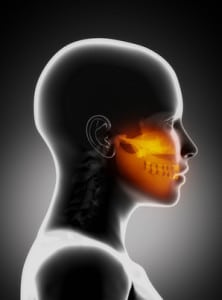
If any of these situations hint at your predicament, then you may be battling TMJ or temporomandibular. Your temporomandibular joint is your jaw joint. When it’s not functioning or aligned properly, this joint can cause a host of problems whose tendrils of pain can be felt not only throughout the head, but throughout the entire body.
Pain is a clue
As common wisdom would dictate, pain is our body’s way of communicating that something is wrong. When your jaw hurts, makes odd noises or locks up, you can be assured that something is askew. This pain can radiate from its source into severe headaches, neck pain, back aches and more.
When our car needs new brakes we hear an awful squealing noise. This noise tells us there is a problem we can either address or leave untreated. If we leave the squealing alone, however, we can be sure that neither the noise nor the problem will go away. In fact, it will actually worsen into a more expensive and painful automotive problem. The same can be said for the machine that is our body.
If left untreated, TMJ can cause a wide array of pains and problems. Included in the list are migraines; jaw pain that can spread down the neck, arms, and back; impaired hearing or ringing; numbness/tingling that can spread down to the fingertips; jaw locking; and poor posture.
There are many potential causes for TMJ. Grinding one’s teeth, often caused by either stress or jaw misalignment, is one common cause. Other possibilities include a dislocated disk in the jaw joint, arthritis in the jaw joint, previous trauma to the jaw and stress-related clenching.
How can you gain an advantage in your Temporomandibular War? Neuromuscular dentistry may help. But first:
What is neuromuscular dentistry?
Neuromuscular dentistry goes beyond the hard tissues of traditional dentistry, evaluating the soft tissues and joint positioning for the jaw. Neuromuscular dentists treat the cause instead of just the symptoms. This specialized branch of dentistry is an added dimension of treatment, analyzing the entire mouth’s form and function. Included in this are not only the teeth and gums, but the muscles, joints, nerve structure, bones, and blood vessels. All parts of the system need to work together for optimal function and comfort.
It is not comfortable to fear you will never open or close your jaw again, or that the joint will pop out if you force the issue. It is not comfortable to fear you will chip and break your teeth while you sleep. It is not comfortable to be ravaged by the ill effects on one’s health and comfort due to stress and jaw misalignment.
A qualified neuromuscular Calgary dentist can work with you to combat your TMJ by evaluating jaw misalignment and finding an optimal posture for both the joint and musculature of the face and jaw.
Take back your life before it becomes too late.
Don’t suffer from pain and fear; misalignment and discomfort. The sooner your TMJ situation is evaluated and corrective steps taken, the sooner you will turn the tide of your Temporomandibular Conflict.
